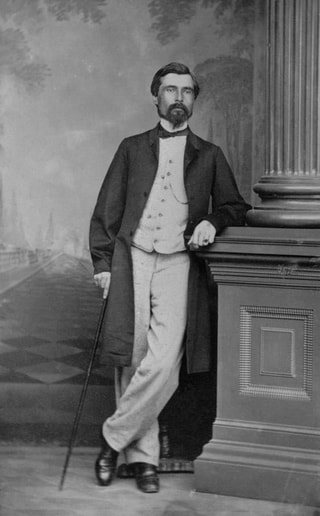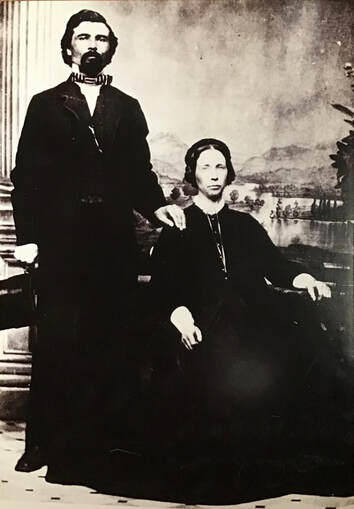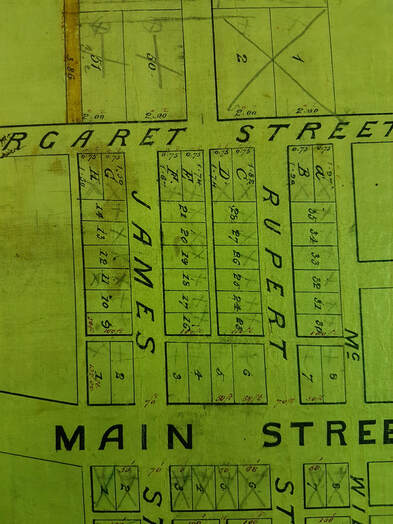James Ross 1835 - 1871
Early life and educationJames Ross was born on May 9th, 1835 in the Red River Settlement. His father Alexander Ross worked for the HBC before settling at Red River in 1825. His mother was Salis Timentwa (Sarah Ross), a Sylix woman from the Okanagan region.
James took over the many roles his father had in the settlement, such as Sheriff. He pursued his education at the University of Toronto, graduating with honors and later receiving his master’s degree from the same University. While he was in Toronto, James married Margaret Smith and had five children with her. He later moved back to the settlement to handle some family matters presented by his father’s ageing condition. |
|
In 1869, James and his family moved back to the Settlement where he became involved in local politics. He was nominated by the Anglophone-Métis community to represent their concerns during the Convention of forty, a series of meetings split evenly between the French and English parishes. James believed that people needed to cooperate in order to avoid conflict. His Scottish-Metis background likely left him in a difficult position as political conflicts took on an increasingly ethnic dimension, and James became a leading moderate voice. His identity and beliefs put him in opposition to those who used to support him, and he was blacklisted from the Canadian Party.
|
POlitics in the settlementUpon his return to the settlement in 1859, he was appointed Postmaster, taking over the job after his brother William's untimely death. He joined in the founding of the Nor’ Wester, the first newspaper in the Settlement, along with his brother in law William Coldwell. James built a reputation for writing articles that heavily-criticized the Canadian Imperial government and the HBC, which eventually led them to revoke his many official titles and roles. He then moved back to Ontario where he worked as a journalist for other publications such as The Globe, and continued to criticize the HBC and the Canadian government.
|
James initially supported Canadian annexation of Red River, because he believed it would bring political freedom from the HBC's corporate domination. He felt that a rail connection to the east would bring economic development and major improvements to people's quality of life. As the situation progressed, extremists like John Christian Schultz rose to prominence in the Canadian Party. They began a fight motivated by racism and religious discrimination, aiming to break the existing social order in Red River and overwhelm Metis communities with British colonists from the Canadian provinces.
Due to his now-complicated position in politics, James became more closely aligned with Riel’s Provisional Government. He acted as the government's English spokesman as well as the opposition within the group, agreeing with Riel's aims in principle, but frequently arguing about the right approach. His moderate position was seen as valuable by Riel, who appointed him as Chief Justice within the Provisional Government. His role in the politics of our emerging province was marked by his vocal opposition to the Canadian Party, a group which advocated for violence and nearly sparked a civil war. James helped negotiate a document known as the "Metis Bill of Rights", which outlined terms for Manitoba's entry into confederation. He opposed violence and distanced himself from Riel when the decision was made to execute Thomas Scott. Following this decision many of James' greatest fears would come true, as the Canadian Government sent in the Wolseley Expedition. This military response pacified the Settlement and engaged in looting, assaults, rapes and even murder as a reprisal against the Metis community.
Manitoba officially became Canada’s fifth province on May 12, 1870, due in no small part to the eloquence and perseverance of people like James Ross. His courage and goodwill helped to shepherd the province through one of its most trying periods.
Like many of the Métis leaders involved in the resistance, James feared retribution for his perceived role in the death of Thomas Scott. On February 1st, 1871, James and his companion Thomas Lynch were ambushed by a volley of rocks, ice, and clubs while leaving a speaking engagement in White Horse Plains. The attack spooked their horses, causing the elderly Lynch to be thrown from his saddle and killed. The attack was rumoured to have been perpetrated by supporters of John Christian Schultz, but no charges were ever pursued.
James also backed Colin Inkster’s political campaign as a moderate candidate for the "Old Timer's Party" in Manitoba's first elections.
Due to his now-complicated position in politics, James became more closely aligned with Riel’s Provisional Government. He acted as the government's English spokesman as well as the opposition within the group, agreeing with Riel's aims in principle, but frequently arguing about the right approach. His moderate position was seen as valuable by Riel, who appointed him as Chief Justice within the Provisional Government. His role in the politics of our emerging province was marked by his vocal opposition to the Canadian Party, a group which advocated for violence and nearly sparked a civil war. James helped negotiate a document known as the "Metis Bill of Rights", which outlined terms for Manitoba's entry into confederation. He opposed violence and distanced himself from Riel when the decision was made to execute Thomas Scott. Following this decision many of James' greatest fears would come true, as the Canadian Government sent in the Wolseley Expedition. This military response pacified the Settlement and engaged in looting, assaults, rapes and even murder as a reprisal against the Metis community.
Manitoba officially became Canada’s fifth province on May 12, 1870, due in no small part to the eloquence and perseverance of people like James Ross. His courage and goodwill helped to shepherd the province through one of its most trying periods.
Like many of the Métis leaders involved in the resistance, James feared retribution for his perceived role in the death of Thomas Scott. On February 1st, 1871, James and his companion Thomas Lynch were ambushed by a volley of rocks, ice, and clubs while leaving a speaking engagement in White Horse Plains. The attack spooked their horses, causing the elderly Lynch to be thrown from his saddle and killed. The attack was rumoured to have been perpetrated by supporters of John Christian Schultz, but no charges were ever pursued.
James also backed Colin Inkster’s political campaign as a moderate candidate for the "Old Timer's Party" in Manitoba's first elections.
End of life
In May of 1871, James Ross became the third person to be admitted to the bar in Manitoba. James struggled with alcohol and illness following the dramatic events of the Red River Resistance, and his health never recovered from the attack that killed Lynch. He contracted tuberculosis and died suddenly on September 20, 1871 at the age of 36. He was considered one of the Red River Settlement’s most important Metis political figures.







